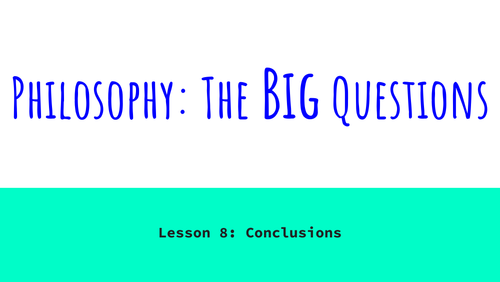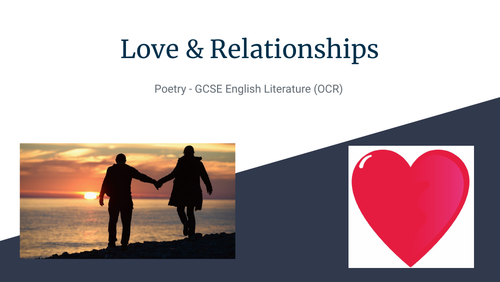
8Uploads
4k+Views
495Downloads
All resources

Speeches that Changed the World (5 Lessons)
A course on important speeches from historical figures.
The attached PDF contains a link to a Google Drive folder containing 5 sets of Google Slides, each one a separate lesson (outline below).
To make edits, copy and paste the slides into your own Google Drive.
Lesson 1. Moses (the Ten Commandments)
Lesson 2. Socrates (the Apology)
Lesson 3: Elizabeth I (Speech to the Troops at Tilbury)
Lesson 4: John F. Kennedy (Inaugural Address)
Lesson 5: Martin Luther King, Jr. (‘I Have A Dream’)
Each lesson contains the following slides:
A title slide
Course outline + learning objectives
A matching exercise on speech techniques (answers in speaker notes)
Context (videos/research on the speaker)
The speech itself (abridged in some cases)
The legacy/impact of the speech
A 10-question quiz (answers in speaker notes)
A 30-word glossary of key terms
Recommended sources e.g. books, podcasts and websites
Homework: link to an online vocab quiz + task for the speech

John Locke Institute Essay Writing Course (20 Lessons)
An essay writing course on the John Locke Institute Essay Competition (junior prize, 14 and under), focusing on past questions and how to tackle them.
The attached PDF contains a link to a Google Drive folder containing 20 sets of Google Slides, each one a separate lesson (outline below).
To make edits, copy and paste the slides into your own Google Drive.
Part 1
Lesson 1: Why is John Locke sometimes called the father of liberalism?
Lesson 2: Before a certain time almost everybody would have held some belief which we now find repugnant. Does this mean we cannot admire or commemorate the people who helped to shape the modern world?
Lesson 3: Should the John Locke Institute change its name?
Lesson 4: Is Oxford overrated?
Lesson 5: What, if anything, do your parents owe you?
Lesson 6: What is something important, about which nearly everybody is wrong?
Lesson 7: Have things improved?
Lesson 8: If you had $10 billion to spend on making the world better, how would you spend it?
Lesson 9: Just because you’re a millionaire doesn’t mean you should get better healthcare than the rest of us, does it?
Lesson 10: What should we do to improve the lives of poor people?
Part 2
Lesson 1: Should we raise the voting age to 25?
Lesson 2: Is safety more important than fun?
Lesson 3: Should the law ever prevent people from freely making self-harming decisions? If so, what should and shouldn’t be forbidden – and according to which principles?
Lesson 4: Who should own your data? The companies with which you agree to share your data, everybody, just you, or nobody?
Lesson 5: When, if ever, have there been ‘good’ revolutions?
Lesson 6: Who was the best leader of all time?
Lesson 7: Should candidates for high office be judged unfit on the basis of something they said or did when they were very young?
Lesson 8: According to Nobel Laureate, Milton Friedman, ‘there is one and only one social responsibility of business…to increase its profits…’
Do you agree?
Lesson 9: Is inequality increasing? Does it matter? What, if anything, should we do about it?
Lesson 10: How socialist is Sweden?
Each lesson contains the following 12 slides:
A title slide featuring the essay title
Course and lesson aims + a relevant quote
Relevant research and content for the essay question, including YouTube videos
Introduction guidance and a model introduction
Body paragraph guidance and a model body paragraph
Conclusion guidance and a model conclusion paragraph
Overall structure + bibliography guidance with an example
A 10-question recap quiz (with answers in the speaker notes)
A 30-word glossary of key terms
Recommended sources e.g. books, podcasts and websites
Homework: link to an online vocab quiz + task for the next essay

Philosophy: The Big Questions - Lesson 8
Lesson 8/8 on the Big Questions in Philosophy
Taught to 8-13 year olds, but delivery can be modified to suit a wider age range
Lesson 8: Conclusions
Lesson 1 Recap: Origins of Philosophy
Lesson 2 Recap: Practical Exercises in Philosophy
Lesson 3 Recap: How did life begin?
Lesson 4 Recap: Are we free?
Lesson 5 Recap: Do ghosts exist?
Lesson 6 Recap: Is any of this real?
-Lesson 7 Recap: How can we live a good life?
End of course quiz
Other Big Questions

Guided Reading: Original Alien Story
An original story I wrote about an alien sighting, aimed at 7-9 year olds.
Includes activities with answers and a home assignment.
Teaches the following:
Spelling and phonics (‘silent’ letters in words with ‘sc’ in them e.g. science)
Grammar (understanding how to use commas to indicate parenthesis)
Vocabulary (including scientific terminology)
Emotional intelligence (emphasis on empathy and understanding others’ perspectives)
Critical thinking
Each page has the following:
The story itself
Unfamiliar vocabulary defined in age-friendly ways
Discussion points for teachers to raise with students

OCR A Level RS: Timeline of Key Thinkers
A PDF listing some of the most important philosophers/thinkers from the spec, from ancient times to present day
60 thinkers in total
incorporates the new thinkers from the teacher guides on the OCR website
Above each image is the following information:
the philosopher’s name
dates
what they’re known for
key ideas or contributions
notable works

OCR Love & Relationships Poems, GCSE Eng. Lit
Every poem in OCR’s Love and Relationships collection for English Literature GCSE.
Each poem is printed, accompanied by the following:
Colour-coded labelling of poetic techniques
Views of each poet on love and relationships
Form
Structure
Language
Rhyme
Context (where relevant)
Tone
Also includes glossary of some poetic terms, exam structure, and key tips from examiners, based on examiner reports.

Guided Reading: Original Egyptian Story
An original story I wrote about an Egyptian mummy, aimed for 7-9 year olds.
Includes activities with answers and a home assignment.
Teaches the following:
Spelling and phonics (for words with ‘i’ sounds spelt with a ‘y’)
Grammar (understanding nouns and pronouns)
Vocabulary (including words related to mythology and ancient Egypt)
Emotional intelligence (emphasis on communication and teamwork)
Critical thinking
Each page has the following:
The story itself
Unfamiliar vocabulary defined in age-friendly ways
Discussion points for teachers to raise with students

OCR A Level RS: Key Vocabulary
Key vocabulary packs for the Philosophy, Ethics and Developments (Christianity) topics on Knoword
18 packs in total, each with 40 words
PDF contains link to each pack








